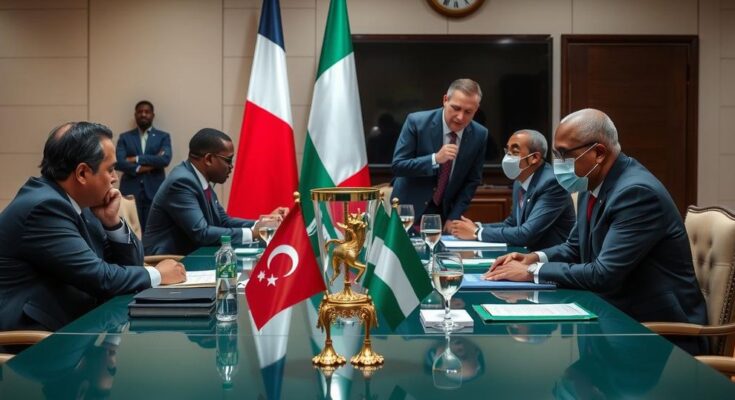France has categorically denied allegations from Niger’s military leader, Gen. Abdourahamane Tchiani, that Nigeria is aiding France in destabilizing Niger. The Nigerian government also rejected these claims, asserting a commitment to maintaining amicable relations with France. The controversy highlights regional tensions amidst broader security challenges influenced by external powers and armed groups originating from conflict zones like Libya.
On Wednesday, France dismissed claims made by Niger’s military leader, Gen. Abdourahamane Tchiani, asserting that Nigeria had agreed to allow France to use its territory to destabilize Niger. In an interview, Mr. Bertrand de Seissan, the Political Counsellor at the French Embassy in Nigeria, labeled these accusations as “groundless,” emphasizing that neither France nor Nigeria had discussed or considered any plans for such actions.
Gen. Tchiani recently alleged that Nigeria was collaborating with France to disrupt Niger, accusing Paris of planning attacks utilizing Nigeria and Benin as bases. He further claimed that France had been negotiating with terrorist factions within Nigeria, including Boko Haram, and had allegedly made substantial payments to the Nigerian President, Bola Tinubu, to establish a military presence.
However, the Nigerian Ministry of Foreign Affairs refuted these assertions, highlighting that allegations of French military operations in northern Nigeria aimed at destabilizing Niger are unfounded. Spokesman Kimiebi Ebienfa reiterated that Nigeria maintains a cordial relationship with France, built on mutual respect and non-interference in domestic matters. During an appearance on Arise TV, Nigeria’s Minister of Foreign Affairs, Ambassador Yusuf Tuggar, echoed this sentiment, clarifying that longstanding relations with France remain unaffected by tensions in the Sahel region.
Ambassador Tuggar stressed that Nigeria’s approach to addressing insecurity cannot be limited to partnerships with neighboring countries but must include cooperative efforts with major powers like France, the United States, and Russia. He pointed to ongoing challenges, particularly concerning weaponry and fighters emerging from Libya, necessitating a broader coalition for stability.
In light of these developments, French President Emmanuel Macron, speaking at a foreign policy conference, rejected claims of France’s withdrawal from the Sahel, labeling Sahelian leaders as “ungrateful” for shifting their focus away from the fight against terrorism. Macron’s comments reflect ongoing tensions and a complex geopolitical landscape in West Africa.
The political landscape in West Africa, particularly concerning relationships between countries like Nigeria, Niger, and France, has become increasingly complicated due to allegations and tensions following military coups in the region. Following a coup in Niger, accusations arose regarding foreign involvement in destabilizing actions. This context includes ongoing security challenges, such as terrorism and the spread of armed groups from chaotic regions like Libya. France, historically involved in African affairs, faces criticism amid changing dynamics in Sahelian leadership and public sentiment toward foreign military presence. France’s relationships with Africa and particularly the Sahelian nations are being scrutinized against a backdrop of rising anti-French sentiment and the military’s role in local politics.
In summary, the allegations made by Niger’s military leader regarding France and Nigeria’s purported plans to destabilize Niger have been firmly refuted by both nations. The relationship between Nigeria and France continues to be characterized by mutual respect and cooperation, despite the regional security challenges. Officials emphasize the necessity of strong international partnerships to address issues of insecurity and terrorism effectively. Ongoing geopolitical complexities necessitate dialogue and collaboration among countries involved, including major global powers, to foster stability in the region.
Original Source: punchng.com




